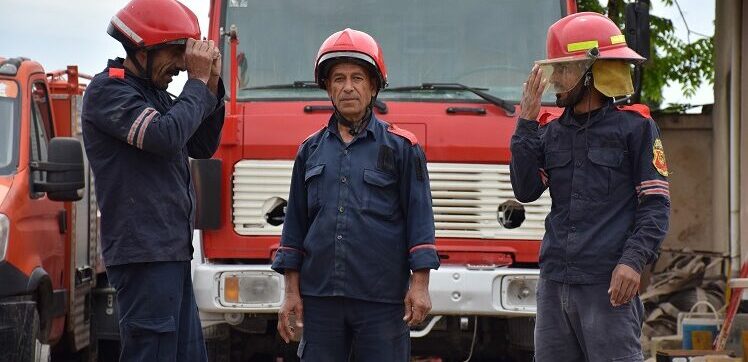[On 5 June 2020] a fire started in a field near the International Commune. It’s unclear if it was started deliberately or accidentally. Last year ISIS sleeper cells and other Turkish proxies waged a brutal campaign of arson against crop fields in Rojava. Many thousands of acres of wheat were lost, and a number of farmers died fighting the blazes. As the summer gets hotter and the wheat ripens and dries in the fields, a similar campaign is starting again.

Last year the Autonomous Administration was largely unprepared for this new form of terrorism. The fires were battled mainly by untrained, poorly equipped volunteers from nearby villages. But building on those experiences, a rural fire brigade has been organised and equipped. In addition, 45,000 members of the Civil Defense Forces (HPC – volunteers who work to provide local security in their villages or neighbourhoods) and Internal Security Forces are patrolling to watch for fires, and on call to fight them. The quick response of these forces two days ago meant that the fire near us was extinguished in around an hour, before it had reached the village. The destroyed crops and grazing land are a huge loss to the local community and to the self-sufficiency of the region. But without the firefighters it would have been far worse.

The threat this year is much higher closer to the border with Turkish-occupied Kurdistan. The security forces have exposed and arrested many sleeper cells over the winter, and this has led to far fewer fires being started away from the border. But Turkish troops and proxies are making up for this by firing artillery shells into fields, or by setting fires in the areas they control so that the wind blows them across the border.

Many villages are responding autonomously to the threat by arranging for someone to always be on watch for fires. This grassroots self-organisation is a great example of how the revolution here is based in local communities. Rather than relying completely on the Administration, the villagers are doing everything they can themselves. Keeping watch, reporting fires, and immediate response can be organised locally, so they are handled by each village. The training and deployment of large numbers of volunteers or internal security forces requires a wider pool of people, so is handled by the municipality. And the purchase and maintenance of specialised firefighting equipment also makes little sense for individual villages, so is also handled by the municipality.
The worst months for arson are yet to come, and everyone expects the Turkish state to do everything they can to destroy this year’s crops. Already we have seen firefighters shot at, and casualties are expected. But society is organised, and prepared, and motivated to fight back and protect their lands.

